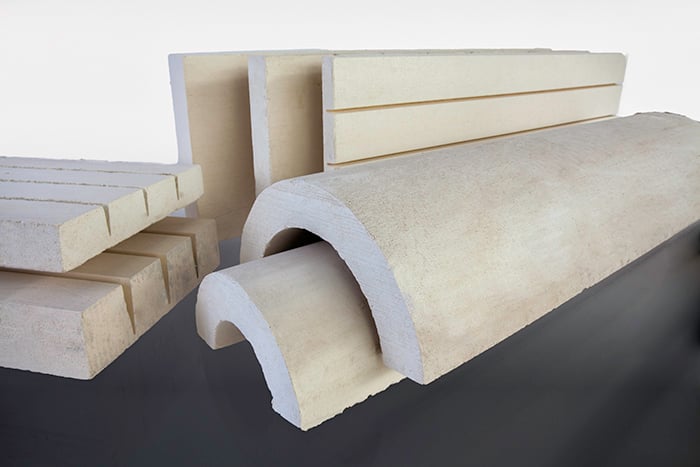
Finding the right insulation solution for your industrial application can be more of a challenge than you would like, once you consider everything your insulation needs to do. One product may provide better thermal protection, another insulation may be water resistant, and others are better for the environment or just have more durability. What if your application demands that you not sacrifice in any of these areas?
Calcium silicate insulation does everything you need and more. Let’s dive into what this insulation material is and why it is so effective in diverse applications.
What Is Silicate Insulation?
Calcium silicate insulation—or CalSil—is an insulation material with high-temperature structural integrity, high compressive strength and corrosion inhibition. It is used to insulate high-temperature pipes and equipment and for fire endurance applications, and it quells common concerns about insulation integrity.
Calcium silicate insulation is composed of inorganic, non-combustible, non-asbestos materials. Mineral fibers or cellulose fibers are pulped, molded and cured under high temperatures before the CalSil is formed into blocks, elbows, boards and segments.
Uses of Calcium Silicate Insulation
Because it is well known for durability, calcium silicate insulation is used to insulate two opposite ends of the application spectrum: high-temperature or corrosion-inducing applications. Calcium silicate insulation is ideal for a wide range of use cases, such as commercial and industrial.
CalSil is a workhorse for diverse insulation needs. However, as rugged as the material is, there are still both pros and cons of using calcium silicate insulation.
Pros of Calcium Silicate Insulation
The best thing about calcium silicate is that it protects pipes and other components in so many ways. Add to that the fact that it is generally easy to use, and it makes for a highly sought-after insulation solution. Let’s dig into a few reasons why calcium silicate insulation outperforms alternatives.
1. Fire Protection
Calcium silicate insulation is made up of non-combustible material, enabling it to withstand fire exposure. In the event of fire, CalSil will not ignite or emit toxic smoke.
2. Water Resistant and Soundproof
Calcium silicate insulation keeps working regardless of humidity levels. It does not swell or become deformed due to environmental changes.
3. Excellent Heat Insulation
These products can withstand temperatures up to 1200 F in pipe and block form, or 1700 F in fire endurance board form. Its crystalline structure gives calcium silicate strong insulating properties.
4. Environmental Protection
Because it is asbestos-free, calcium silicate provides an eco-friendly and non-toxic insulation alternative. As a bonus, it is also landfill disposable.
5. Durability
You certainly do not want to replace your insulation frequently. Calcium silicate insulation is long-lasting, giving you a better ROI. Along these lines, the material inhibits corrosion under insulation while still being strong and lightweight.
6. Reduced Labor Costs
Custom-fabricated calcium silicate products eliminate the need for the time and cost of in-field fabrication. All you need to do is install your insulation!
7. Multi-Purpose Applications
Calcium silicate insulation is very versatile. Because it can be custom shaped, you can use it as pipe insulation, fitting insulation and equipment insulation in industrial, refinery or power-generation environments.
Cons to Consider
Although it may be superior in several ways, calcium silicate insulation is not quite perfect. Before you go all-in on the solution, you should consider the drawbacks as well. These drawbacks can include the following:
1. Complicated Replacement and Installation
While custom fabrication eliminates the need for last-minute modification, installing calcium silicate can be still delicate. The process involves metal keel, which can be difficult to manipulate. As a result, installation, maintenance and repair may take longer.
2. Higher Comparative Cost
As a premium product, calcium silicate insulation sits on the higher end of the price spectrum. As a result, other materials are frequently substituted, such as stone wool. However, as the adage goes, “You get what you pay for.” CalSil makes up for its higher sticker price with myriad benefits.
3. Customization Time
A major draw for calcium silicate can also be a downside if you need an immediate solution. Customized fabricated calcium silicate enables you to craft an insulation solution for any size, shape or need. However, it takes more time to gather measurements and manufacture the end product.
Distribution International's Calcium Silicate Insulation Products
As experts in the insulation supply industry, Distribution International can help you find the best calcium silicate product for your building. We offer various insulation configurations to suit your components.
Calcium Silicate Block
Our block insulation is available as a flat block and is 3-V scored. CalSil block is available in thicknesses ranging from 1 inch to 4 ½ inch, and it can withstand temperatures up to 1200 F.
Calcium Silicate Curved Segments
We also offer segments cut to match the radius of a large diameter pipe. A flexible solution, curved segments can be fabricated for pipe sizes beginning at 18 inches.
Calcium Silicate Elbows
Angled components can be tricky to protect. Calcium silicate elbows can be fabricated as long radius (LR), short radius (SR) or socket weld (SW) elbows at either 90 degrees or 45 degrees.
Calcium Silicate Flange Covers
Made from high-temperature calcium silicate, our flange covers are designed to protect and insulate flanges. CalSil flange covers can withstand up to 1200 F.
Use Calcium Silicate Insulation for Your Project
From high-temperature structural integrity to tremendous compressive strength and resistance to corrosion, calcium silicate insulation works hard to protect the components in your building. If you are in the market for an insulation option that provides 360-degree protection, it could be the right material for your insulation needs!
Browse online to learn more about your options.